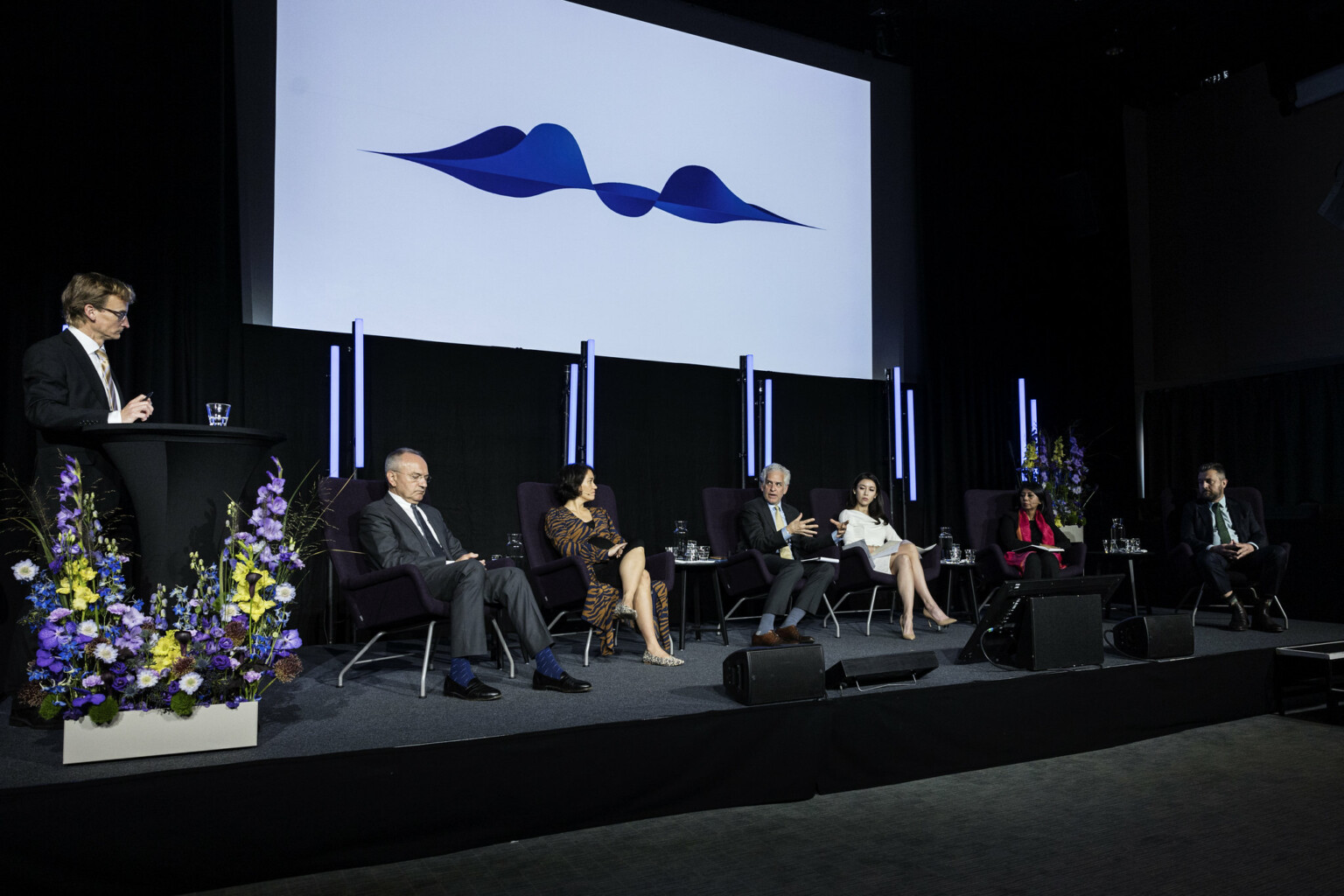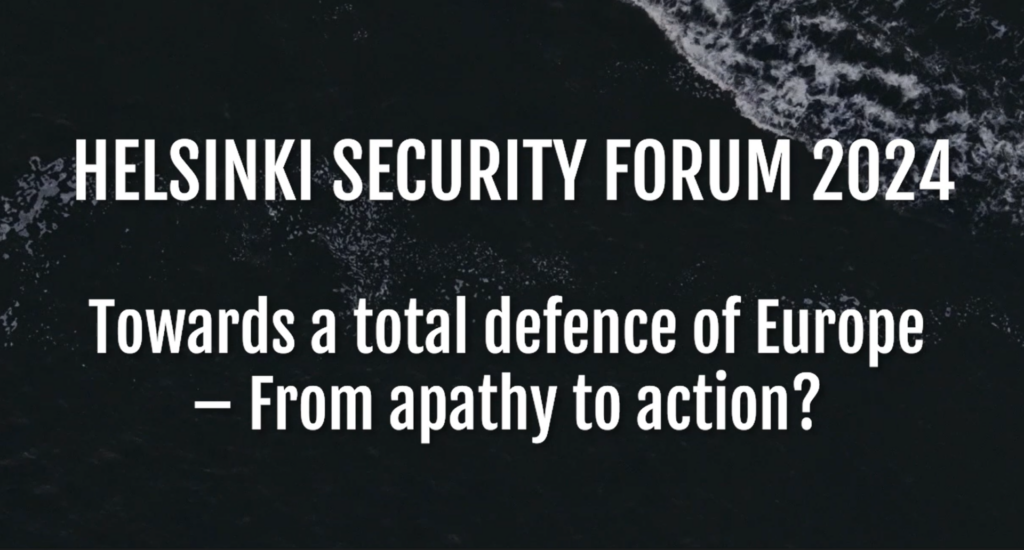Publications

Session III: Reverberations in the Indo-Pacific of the war in Ukraine
Russia’s war of aggression against Ukraine has had significant effects on Indo-Pacific security dynamics and great-power competition. The third session of Helsinki Security Forum 2023 turned the focus to the region. The expert speakers addressed the challenges posed by the war, as well as Russia and China’s policies implications to the rules-based international order.
Helsinki Security Forum 2023 addressed the wide-ranging implications of the Russian war of aggression. In the third session of the conference weekend, the war in Ukraine was looked at from the viewpoint of the Indo-Pacific area.
Research Professor Mikael Mattlin from the Finnish Institute of International Affairs delved into the theme with speakers Professor Ummu Salma Bava from Jawaharlal Nehru University, Founder of CoStruct and Vice Chairman of Bridge Technologies Jessica Berlin, Senior Fellow and Director Andrew Michta from the Atlantic Council, Senior Analyst Euan Graham from the Australian Strategic Policy Institute, Senior Fellow Lynn Kuok from IISS Singapore, and Barry Pavel, Vice President of RAND National Security Research Division and Director of the National Defense Research Institute.
The speakers recognised that Russian aggression in Ukraine is not only a European issue. The erosion of the global rules-based order in one part of the world spills over to other areas as well, Lynn Kuok summarised. She also noted, that while this is the view of European countries, it unfortunately has not received wide acceptance through the Indo-Pacific.
Since the beginning of the war, several East Asian countries have, however, become more involved in European security matters. They have provided aid to Ukraine and increased arms sales to Poland. Even China has participated in the efforts to end the war.
According to Andrew Michta, the long-term implications of this development to European security is a key question. While the arenas of Europe and the Indo-Pacific are linked to the same set of problems, the security systems of the regions are significantly different.
“The erosion of the global rules-based order in one part of the world spills over to other areas as well.”
The speakers also highlighted that the West lacks understanding in China’s ways of acting in power politics, such as its partnership with Russia. According to Barry Pavel, the countries are not only talking about a strategic partnership, but are very much demonstrating it in practice.
“This alliance is a very dangerous one for the West as Russia provides China with many assets in terms of military technology”, Andrew Michta pointed out. According to the speakers, China is also actively helping Russia by buying energy.
Jessica Berlin noted that the planning horizons of European countries are based on the electoral cycles — whereas authoritarian states China and Russia make decisions for generations. This poses a serious weakness in the Western response to any threats by the great powers. According to Berlin, the West needs to defeat Russia to deter China’s influence in Europe. Barry Pavel brought up a similar point in the discussion, saying that Putin’s defeat would greatly damage China and its leader Xi Jinping.
Michta said that there is not enough urgency among the Western political leadership to address the threat of China and Russia. China particularly poses an existential threat due to its different ideological position.
“The West needs to defeat Russia to deter China’s influence in Europe.”
The discussion then shifted to India and its role in the current security environment. According to Ummu Salma Bava, one fundamental question lies in the state of multilateralism. Its current structure is not dynamic enough to response to the changes of the global economy or the position of India, Bava noted. The West cannot shape global multilateralism through their own lens and expect countries from other parts of the world to play along.
“India is showing that it can effectively be the kind of an actor that can talk to both sides”, she said.
According to Ummu Salva Bava, even if Russia is now defeated, history will be a reminder that you can’t escape your geography.
“In India we know that we have to engage with China”, she noted.
Lynn Kuok grabbed onto these views by commenting the way national interests are formed. Every country naturally puts their national interests first. However, how a country looks at its national interests and whether they value multilateralism and the rule of law differs. More and more countries have a very narrow view on national interests, and are saying that they don’t need to take sides in the case of Russia and Ukraine, Kuok explained.
“The rule of law is still in every country’s interest”, she argued.
Australian policy analyst Euan Graham moved on to address the role of Australia in the Indo-Pacific power dynamics and the 2021 AUKUS initiative, a trilateral security pact between Australia, the UK and the US for the Indo-Pacific region. For a long time, China and Russia were revising the order, and AUKUS was a resetting force of a power balance. The initiative came from Australia in a very desperate situation, Graham explained.
“Deterrence has to work on a much broader scale than just the military scenarios.”
Euan Graham also described how Australia faced economic coercion by China but was able to weather the storm by sticking to its political principles.
“Deterrence has to work on a much broader scale than just the military scenarios.”
Watch the whole discussion here and read more on the topics of HSF 2023 here.

HSF 2025 asks ‘The Hour of Europe’: Can the old continent chart a new course for its future?
Helsinki Security Forum 2025 brings experts and decision-makers together to ponder the hard questions and explore Europe’s path forward.

Helsinki Security Forum 2024 addresses the need for European total defence
The third annual Helsinki Security Forum (HSF) will be held on 27–29 September 2024. This year’s conference is titled Towards...

for HSF Blog
Rejecting Russian Spheres of Influence
The EU has rejected the language of spheres of influence in favour of an international order based on common rules...